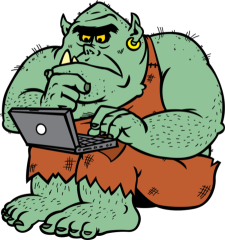Dabei fiel auf, daß die meisten der beleidigenden Tweets den Regeln des Social-Media-Betreibers zuwiderliefen, jedoch von deren Seite nichts dagegen unternommen wurde. Außerdem konstatierten die Autoren, daß es nichts bringe, die „Trolle nicht zu füttern“, da es sich bei ihnen häufig um Personen mit antisozialer Persönlichkeitsstörung handle, die sich, als „kulturelle Aasfresser“, so die Autoren, von alternativen Fakten und „fake news“ ernähren und durch die Verdammung anderer erst so richtig aufblühen.
______
Referenzen:
[1] Synnott, J., Coulias, A., & Ioannou, M. (2017). Online trolling: The case of Madeleine McCann. Computers in Human Behavior, 71, 70-78.
[2] de Seta, G. (2013). FCJ-167 Spraying, fishing, looking for trouble: The Chinese Internet and a critical perspective on the concept of trolling. The Fibreculture Journal, (22 2013: Trolls and The Negative Space of the Internet).
[3] Phillips, W. (2013). The house that fox built: Anonymous, spectacle, and cycles of amplification. Television & New Media, 14(6), 494-509.
[4] Hardaker, C. (2013). “Uh…. not to be nitpicky, but… the past tense of drag is dragged, not drug.”: An overview of trolling strategies. Journal of Language Aggression and Conflict, 1(1), 58-86.
[5] Lasseter, A. E., Jacobi, K. P., Farley, R., & Hensel, L. (2003). Cadaver dog and handler team capabilities in the recovery of buried human remains in the Southeastern United States. Journal of forensic sciences, 48(3), 617-621.
[6] Warren, C. (2015). What the dog knows. New York: Touchstone a division of Simon & Schuster, Inc.
[7] Phillips, W. (2015). This is why we can’t have nice things: Mapping the relationship between online trolling and mainstream culture. Mit Press.




Kommentare (64)